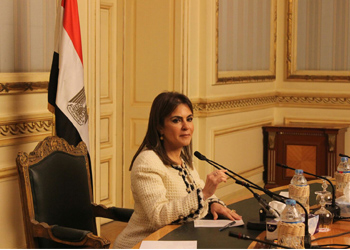Egypt could become a new international hub for investment and international cooperation, Minister of Investment Sahar Nasr said during an economic forum organised by Al-Ahram Saturday.
Nasr told the Second Al-Ahram Economic Forum, held under the slogan, “Chances of Investment … Growth and Implementation,” that Egypt holds many advantages and factors to attract local, Arab and foreign investment.
“We’re sending a message to investors that their investments and capital are safe in Egypt,” she said, underlining that Egypt was exerting all efforts to create an appealing investment atmosphere.
The forum was attended by several bank officials as well as a number of businessmen.
According to Nasr, Egypt has developed the legal framework for investment, easing procedures for investors while also carrying out measures to support entrepreneurship and young investors, to provide more opportunities to youth and open up new prospects for them, contributing to rising economic growth rates.
The minister added that reform measures undertaken by the government have reaped some benefits, where foreign direct investment (FDI) has risen 14.5 percent to reach $7.9 billion during the financial year 2016/2017, compared to $6.9 billion during the financial year 2015/2016.
Nasr added that Egypt has taken definitive steps to improve the climate for investment in the recent period, including Egyptian President Abdel Fattah al-Sisi’s ratification of a new investment law.
In June, El-Sisi ratified a long-awaited investment law that grants investors a number of incentives, including tax breaks.
The law, drafted by the Cabinet in 2015 and passed by parliament in March 2017, aims to cut red tape and attract foreign investment.
Last week, Egypt issued the investment law’s bylaws, which includes 141 articles.
Egypt hopes the law will boost much-needed investment by cutting down on bureaucratic requirements, especially for new projects.
Nasr spoke about the law, stressing that it establishes guarantees for investors, investment incentives for entrepreneurship, as well as enhancing sustainable development.
She also said that the economic reform programme the government embarked upon in 2014 would not succeed without a social safety net.
The Takaful and Karama programme, established by the government in early 2015, is a national social safety net programme aimed at protecting the poor through income support.
In 2014, Egypt launched a plan to introduce fiscal reforms, including fuel subsidy cuts that raised prices by up to 78 percent, and levying new taxes to ease a growing budget deficit, along with floating the Egyptian pound in November 2016. Source: Ahram online
Source: Ahram online


